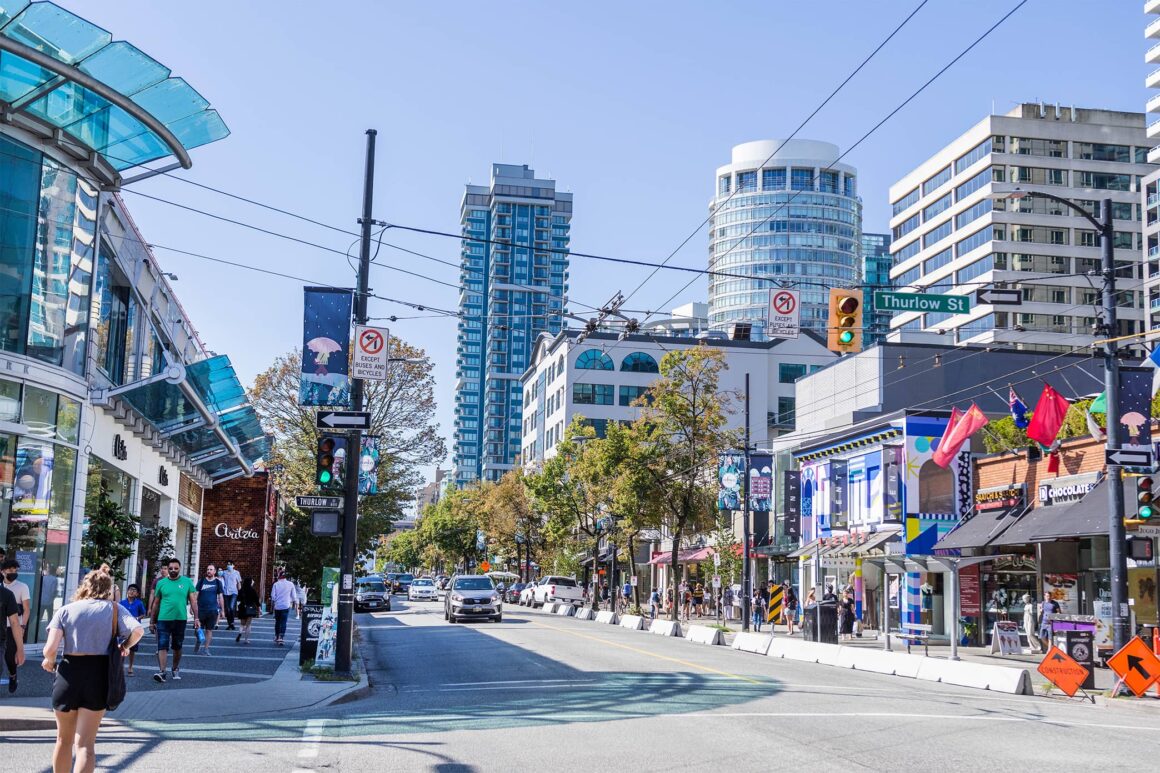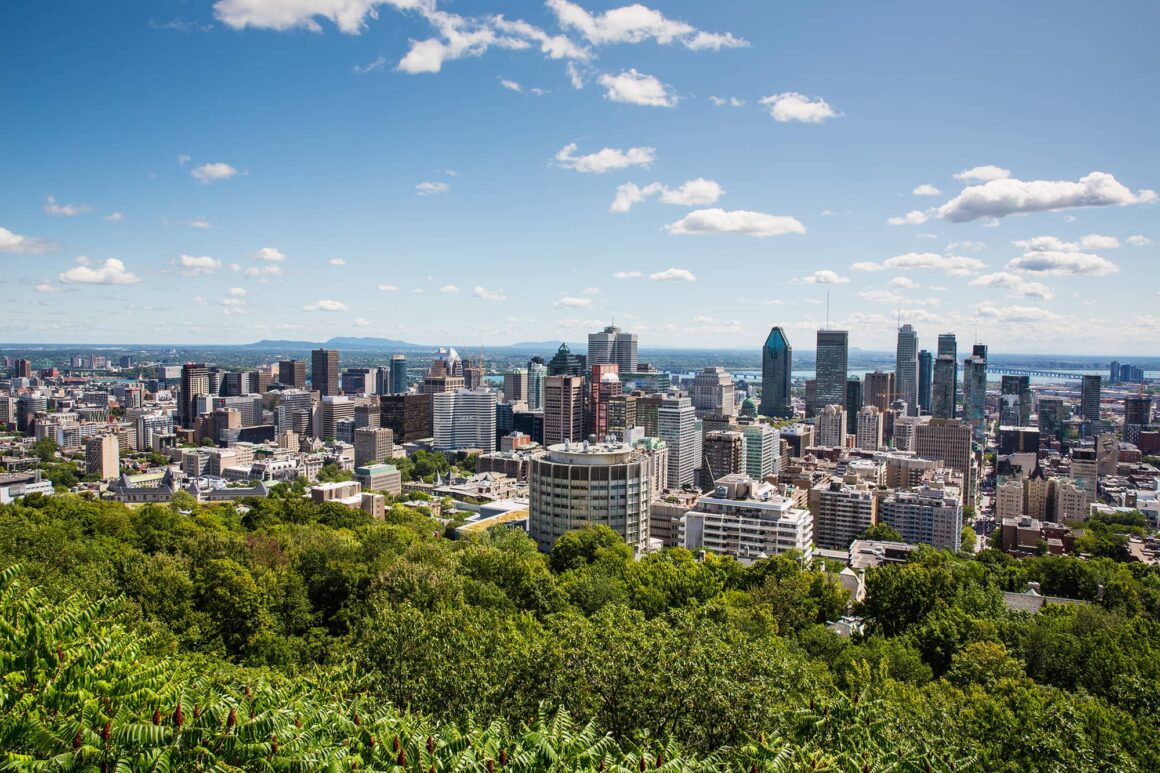Thinking of moving to Canada? Well, you’ll want to consider these pros and cons of living in Canada first.
Canada, often celebrated for its breathtaking landscapes and cultural diversity, is more than just a pretty face.
With one of the highest standards of living in the world, this expansive country offers a unique blend of social, economic, and environmental benefits.
But like any other place, moving to Canada is not all roses. But rest your worries, we’ve got you covered.
Below we delve into the pros and cons of living in Canada by going over different factors such as political stability, networking, health care, weather, tax rates, and many more.
This article contains affiliate links where we may get a small commission if you click on the link and purchase. No extra cost is added to you.
Find the Cheapest Flights to Vancouver
Pros Of Living In Canada
1. “Free” Universal Healthcare

One of the most significant advantages of living in Canada is its universal healthcare system.
Unlike countries where medical care can be a really costly affair (ahem US), Canada offers free healthcare services to its residents.
This means you don’t have to worry about hefty medical bills when you fall ill or require a hospital visit.
Some say the only thing they pay after a surgery at the hospital is the parking fee.
The system is mostly funded by taxpayers and ensures that everyone has access to essential medical services regardless of their financial situation.
From routine check-ups to surgical procedures, the Canadian healthcare system aims to provide quality care for all.
2. High Quality of Life

According to the US News and World Report, Canada ranks high in global quality of life indices, and it’s easy to see why.
The country offers an excellent education system, low crime rates, affordable healthcare, and a strong sense of community.
All of these factors contribute to a high standard of living.
Moreover, Canadians enjoy a balanced work-life dynamic with ample vacation time and family benefits.
The country also places a strong emphasis on environmental sustainability, boasting clean cities and abundant natural spaces.
Whether you’re an outdoor enthusiast or a city dweller, Canada offers a lifestyle that caters to a wide range of preferences and needs.
3. Cultural Diversity
Canada is a mosaic of cultures, offering a rich tapestry of ethnic backgrounds, languages, and traditions.
The three founding peoples – Indigenous, French, and British paved the way for many other racial and ethnic groups to come along.
Nowadays, the country’s multicultural society is one of its strongest assets, fostering an inclusive and welcoming environment.
According to the 2021 Census, Canadians reported over 450 different ethnic origins or ancestries.
Interestingly, while over 60% of Canadians reported a single ethnic origin, a significant 36% reported having multiple ethnic origins.
This diversity not only enriches the cultural fabric but also contributes to a more open and tolerant society, making Canada an attractive destination for immigrants and expatriates.
For that reason, most cities in Canada boast a wide range of cultural activities such as museums, galleries, theaters, while big festivals like Folklorama and Edmonton Folk Festival create a lively tapestry celebrating Canada’s diverse cultures and traditions.
4. Great Educational System
When it comes to education, Canada is one of the global leaders. According to the Organisation for Economic Co-operation and Development (OECD), Canada ranks 7th in the world for education, just ahead of the United States, which ranks 8th.
The Canadian education system is distinct in several ways.
Unlike the American GPA system, Canada uses a percentage system for grading.
The focus is also more on critical thinking and a “no-zero” approach to grading, which encourages students to complete their assignments.
If you settle in Canada with your little family as a permanent resident, a work permit holder, or a study permit holder, education is completely free without any documents needed.
Most Canadian universities primarily consider the percentage grades of Grade 12, the final year of high school, for admissions.
Despite these differences, the education systems of Canada and the United States share many similarities, including a virtually non-existent federal government role in schooling.
5. Safety And Low Crime Rate
If safety is a priority for you, Canada won’t disappoint.
Although it isn’t Japan or Singapore’s level of safety, Canada is one of the safest places to live, ranking 4th in the world for safety in 2021.
This sense of security is further underscored by its low crime rates. In 2021, Canada’s homicide rate was just 1.8 per 100,000 people, making it one of the countries with the lowest homicide rates globally.
The low crime rate is a testament to the effective law enforcement agencies and the general sense of community and responsibility among Canadians.
That being said, you shouldn’t go about leaving your home unlocked or leave your belongings in plain sight. You still want to be vigilant and aware of your surroundings.
Whether you’re planning to raise a family or looking for a peaceful retirement, Canada’s safety metrics are certainly appealing.
6. Natural Beauty

Canada is a paradise for nature lovers, boasting some of the most stunning landscapes and natural wonders on the planet.
From the rugged Rocky Mountains to the serene Maritime coasts, the country offers a diverse range of natural settings to explore and enjoy.
Canada is home to a quarter of the Earth’s wetlands, temperate rainforests, and boreal forests.
Additionally, it holds 20 percent of the world’s fresh water and has the longest coastline of any country.
If that’s not enough to impress you, consider this: Canada has 42 national parks that cover more than 225,000 square kilometers, making up 2.2% of the country’s total land mass.
Whether you’re into hiking, kayaking, or simply enjoying a picnic amidst scenic vistas, Canada’s natural beauty offers something for everyone.
7. Four Distinct Seasons

One of the unique aspects of living in Canada is experiencing four distinct seasons.
Spring and autumn are pretty similar. A day begins with a warm morning and is capped off with a cold evening.
Rainy days are a common scene in both spring and autumn.
But autumn in Toronto appears to be an enchanting scene with warm days lingering.
Autumn also brings a burst of colorful foliage, making it a great time for scenic drives and photography.
The summers are warm, perfect for outdoor activities like hiking, camping, and water sports. Winters, although harsh, offer opportunities for skiing, snowboarding, and other winter sports.
Toronto, Quebec, Victoria, and Vancouver are some of the best places to celebrate Christmas and other year-end festivals.
The changing seasons not only add variety to the year but also allow for a wide range of recreational activities that cater to different interests.
8. Friendly Locals

Well, lots of immigrants are wondering if Canadians are really friendly.
Canadians are generally known for their friendliness and politeness, but not in a way that they are aloof or overly friendly.
In fact, we would say that Canadians do look out for each other.
And just like any other country, Canada’s history was wired with some bad stuff but the country is focusing on acceptance.
The cultural norm of saying “sorry” frequently even when not at fault is a testament to this general demeanor.
This friendliness extends to all aspects of life, from casual interactions on the street to customer service.
Living among such amicable people can make the adjustment to a new country much smoother and more enjoyable.
Although this Canadian stereotype is relatively true, it may be the opposite in larger cities like Vancouver and Toronto, where you may feel more cliquey vibes.
But in suburban environments, you’ll find many friendly folks willing to help you out in any way.
9. Strong Economy
Canada’s economy is not only robust but also diverse, offering a wide range of job opportunities in various sectors.
As of 2022, Canada boasts the world’s ninth-largest economy, with a nominal GDP of approximately US$2.221 trillion.
Real estate, manufacturing, and mining are the top three pillars that drive the country’s economy forward.
Its largest trading partners include the US, China, and the UK, indicating a strong international economic presence.
Furthermore, Canada ranks impressively on The Heritage Foundation’s Index of Economic Freedom, scoring 73.7 and making its economy the 16th freest in the 2023 Index.
If you’re wondering if running a new business is easy in Canada, rest your worries! The process of starting a business is fast and user-friendly.
On top of that, if you’re part of the highly skilled workforce in the country, the growing and attractive economy of Canada will offer a stable platform for growth and success.
10. Political Stability
Amongst the G7 countries, Canada ranks 2nd for political stability thanks to the nation’s commitment to democratic governance, the rule of law, and a transparent legal framework.
For that reason, you never have to worry about stumbling into a risky protest or divided opinions when moving into a new workplace or hanging out with new friends.
The country has primarily been ruled by either the Liberals or Conservative party, both not being as polarizing or on opposite sides of the spectrum as those in the US.
Nor is there any considerable political unrest in the country.
This stability not only fosters a sense of security among residents but also makes Canada an attractive destination for international businesses and investors.
11. Abundance Of Outdoor Activities

Oh talking about celebrating the great outdoors of Canada, its vast landscapes and diverse terrains never disappoint.
The country is like a massive playground for all types of travelers and fitness levels. Whether it’s hiking in the Rockies, kayaking in British Columbia, or ice fishing in Manitoba, the options are endless.
Plus, the four beautiful seasons with their own charming features allow you to stay healthy outdoors as much as you can.
According to a 2021 survey, nearly 8 in 10 households in Canada reported participating in outdoor activities close to home.
This high level of engagement with the great outdoors is not surprising given the country’s vast landscapes and natural beauty.
Speaking of the greenest province in Canada, British Columbia ranks first with its stunning mountaintops and ocean views.
12. Wildlife Encounters

Canada is a country that has the world’s greatest wildlife safaris.
One of the unique aspects of living in Canada is the opportunity for frequent wildlife encounters.
The Canadian species index is extensive, featuring 913 species of birds, fish, mammals, amphibians, and reptiles.
Whether it’s the cheeky raccoons rummaging through your garbage, squirrels darting across your path, or even the occasional bear sighting in more remote areas, Canada’s rich biodiversity adds an extra layer of excitement to everyday life.
Get on a day trip for a chance to spot orcas from your kayaks down the shore of Vancouver Island. Or even have a black bear make a visit to your backyard if you live in the interior British Columbia.
While in Ontario, Algonquin Park draws crowds every June and July to enjoy their Moose Safari.
Those who wanna see the icon of Canada in real life, the cute beavers, seek them out at Jasper National Park and the Rockies.
13. Decent City Public Transportation
When it comes to getting around, Canada’s major cities offer efficient public transportation systems that make commuting a breeze.
From Vancouver’s SkyTrain to Toronto’s TTC and Montreal’s Metro, public transit is generally reliable and clean.
These systems are continually being updated and expanded to better serve growing populations and reduce road congestion.
Speaking of which cities have the best public transport in all of Canada, Toronto, Montreal, and Vancouver are head and shoulders above any other places.
Canada’s public transport may be the best in America, but it does pale in comparison to that of Asia and their bullet trains systems. Much work is still required to connect metropolitan cities with high-speed rail like in Japan and China.
Whether you’re a daily commuter or a tourist trying to see the sights, Canada’s public transport options are both practical and economical.
14. Clean Cities

For the sake of life quality, Canadians care about their surrounding environment and it’s all thanks to their national pride.
On top of that, the country is huge with lots of space and much fewer people.
Part of the taxes also go to public officers who keep the public areas clean. Although this may be different by provinces, most of the cities are well-maintained.
Whether you’re walking through downtown Toronto or exploring a small town in Nova Scotia, the cleanliness is noticeable.
Cons Of Living In Canada
15. High Cost Of Living
While Canada offers a high standard of living, it comes with a hefty price tag, especially if you’re residing in one of the major cities like Vancouver, Toronto, or Montreal.
According to a 2023 survey by Numbeo, Canada ranks as the 22nd most expensive country in the world in terms of cost of living plus rent index.
The housing market further exacerbates this issue, followed by the high standard of living, inflation, and high tax rates.
According to the Canadian Real Estate Association (via Fortune), the average house price in Canada reached a whopping record of $816,720, around nine times the average annual wage.
In Ontario, this ratio jumps to ten times the average wage, and in Vancouver, it’s a staggering fourteen times the average wage.
Even everyday expenses like groceries can take a toll on your budget.
16. Brutally Cold Winters

Canada’s natural beauty is undeniable, but the country’s winters can be incredibly brutal and harsh, especially in the interior and Prairie provinces.
That being said, though it’s not a nationwide thing, certain regions experience a continental climate, where daily average temperatures hover around −15 °C (5 °F) but can plummet to −40 °C (−40 °F) with severe wind chills.
Winnipeg, Manitoba, holds the dubious honor of having the coldest winter weather of any major Canadian city, boasting an average temperature of -19.2°C.
Meanwhile, Vancouver has the mildest winter except for the earliest days of the season when the rains make it worse. The mild winters make it one of the reasons the homeless from around the nation congregate in Vancouver.
Also, those who cannot handle the extreme weather of Toronto and Montreal tend to make Vancouver their home.
While the winter season offers opportunities for winter sports and activities, the extreme cold can be a significant drawback for those not accustomed to such conditions.
17. Tax Rates
Canada’s high standard of living and universal health care contribute to the country’s high tax rates. Canada has a tax burden of 33.45%, ranking at 25th in the world.
This high tax rate can affect your take-home pay and overall financial planning.
However, it doesn’t go the same way for everyone. If you’re a high earner with an annual income higher than $49,000 and are single, then expect to leave anywhere around 15%.
Tax benefits, in return, make up for roads, schools, infrastructure, and healthcare even though such a high tax rate can be a financial burden for both individuals and businesses.
18. Immigration Process
Canada is known for its welcoming stance towards immigrants, boasting one of the highest rates of immigration per population in the world.
Around 500,000 new immigrants arrive in Canada annually, contributing to the country’s cultural diversity and economic growth.
However, the immigration process comes with its challenges.
Canada’s immigration system has been grappling with a backlog problem, exacerbated by factors like the COVID-19 pandemic, age, staffing shortages, high demand, and aging technology.
Another factor that may hold you back in doubt is the certain minimum proof of funds requirements.
We’re talking about language proficiency tests, ECA, medical exams, and application fees.
This backlog can result in prolonged waiting periods and uncertainty for applicants, making the immigration process a potentially stressful experience.
These challenges can be lifted depending on where you’re from. For example, Europeans can look at the IEC Visa, working holiday, and International Experience Class.
19. Long Healthcare Wait Times
Canada’s universal healthcare system is often lauded for its accessibility and quality. On the flip side, the long wait time of up to 27 weeks.
4 weeks may make you think twice, especially if you or your family require frequent or immediate treatment from special physicians.
One contributing factor to these long wait times is limited specialty care resources. For instance, Canada has fewer acute care beds per capita compared to the United States.
Other than that, the high demands on the health care system at large also contribute to the overall scheme.
These delays can result in increased suffering for patients and extreme cases.
Those who have the resources tend to look down south the border or abroad for quicker medical help.
20. Expensive Domestic Travel
Canada’s breathtaking natural landscapes are a major draw, but accessing them can be prohibitively expensive due to the high cost of domestic flights.
The main reason is the limit of budget airlines.
The country’s airline industry is dominated by two major carriers, Air Canada and WestJet, which limits competition and can lead to higher prices.
Additionally, Canadian airlines are facing problems with hidden fees and business practices, adding to the overall cost of travel.
Speaking of landing fees, Canada is one of the highest in the world, let alone terminal fees, and other charges that are passed on to passengers.
These factors combined make domestic air travel in Canada more expensive compared to other countries, limiting accessibility to the country’s natural wonders.
You could find yourself paying similar prices to fly to Toronto from Vancouver as you would from Vancouver to Los Angeles or Vancouver to Hawaii.
This often makes locals consider going abroad rather than domestically.
21. Peculiar Language Barriers In Quebec

Quebec, Canada’s predominantly French-speaking province, offers a unique cultural experience but can pose language barriers for those who aren’t fluent in French.
While many people in Quebec are bilingual, not knowing French can limit your social interactions and job opportunities in the province.
You’re also most likely to see a degradation of service and politeness, especially when it comes to healthcare or at a restaurant.
We’ve personally felt this while in Montreal.
This can be particularly challenging for newcomers who may already be navigating the complexities of immigration and settling into a new country.
Learning French can be a rewarding experience but is something to consider if you’re thinking of moving to Quebec.
22. The Nightlife is Terrible
If you find yourself in a smaller town (that isn’t Toronto, Vancouver or Montreal), it is a given that the nightlife will be lacking.
But even in the big cities, you’ll find places close much earlier than other Metropolitan cities like New York and Asia.
For instance, many restaurants in Vancouver close at 8PM and the clubs turn on the lights at 2AM. That is hardly the case in Asia or Europe, where people can be seen coming out of the clubs at sunrise.
While this can be a pro for those seeking a quieter lifestyle, it can be a con for those accustomed to a bustling social scene, diverse dining options, or frequent nightlife activities.
So if clubbing and being out late with friends is important to you, you’ll want to look elsewhere.
23. Expensive Housing Market

The Canadian housing market has been heating up, with the average home price reaching $709,218 in June 2023, a year-over-year increase of 6.7% compared to June 2022.
Urbanization is one of the major factors to blame, followed by population growth, land cost, low-interest rates, and foreign investment.
Housing is also one of the top GDP contributors for Canada (8.9 % in 2022).
This surge in prices is particularly noticeable in cities like Toronto and Vancouver.
Toronto, despite having the highest overall cost of living, has a median home price of $1,095,617.
Vancouver, on the other hand, leads in terms of housing costs, with a median rent for a studio apartment surpassing $3000.
The steep housing costs can be a significant financial burden, especially for newcomers or those without substantial savings.
24. Increasing Job Competition

Canada’s job market is robust but also highly competitive, especially for newcomers who may not have an established network or local work experience.
According to a 2023 report, Toronto stands as the 14th most competitive city globally, with an average of 65.5 applicants per job.
Other Canadian cities like Vancouver, Markham, and Brampton also feature highly competitive job markets.
The competition is not just local. Canadian workers increasingly find themselves vying for positions against high-skilled workers from around the world, as Canada’s immigration policies open doors for global talent.
This heightened competition can make job hunting a challenging experience, particularly in specialized fields.
25. Seasonal Affective Disorder (SAD)

The long, harsh winters in Canada can take a toll on mental health, leading to a higher prevalence of Seasonal Affective Disorder (SAD).
This type of depression occurs at a specific time of year, usually in the winter, and can affect your mood, energy levels, and overall well-being.
Immigrants to the northern end of the country such as Quebec and Ontario have reportedly failed to cope with the winter and left. You don’t wanna be the same.
In the case of Vancouver, though it’s much more temperate than other parts of Canada, it sees over 200 days of rain per year.
Therefore, depression is a serious problem during those times of the year.
While some people find the winter months invigorating, others may struggle with the lack of sunlight and outdoor activities, requiring treatment or light therapy to cope.
26. Political Divides
Canada is generally known for its political stability.
Even though less intense and dramatic than its neighboring country, Canada still has its share of political divides between supporters of the Liberals and the Conservatives.
Local newspapers address it as Canada’s rural-urban divide, and it happens in almost any big city from the ongoing tradition of separatist ambitions in Quebec to the newly emerging ambitions in Alberta and Saskatchewan.
Whether its issues related to immigration, environmental policies, or social welfare, the political landscape can be contrasting.
Understanding the political climate is essential for those considering making Canada their home, especially if you have strong political convictions.
27. Distance From Family
No matter which city or country you relocate to, the distance from family can be both an emotional and logistical challenge.
It goes the same way for Canada.
While technology can bridge the gap to some extent, time zones, long flights, and the high cost of international travel can make frequent visits difficult, unless you live in the Southern provinces and your home is just across the border in the US.
Special occasions, emergencies, or simply the need for familial support can make the distance feel even more significant.
This is a crucial factor to consider, especially for those who are close to their families or have dependent relatives.
Summary of Pros & Cons of Living in Canada
| Pros of Living in Canada | Cons of Living in Canada |
| Universal Healthcare | High Cost of Living |
| High Quality of Life | Cold Winters |
| Cultural Diversity | Tax Rates |
| Educational System | Immigration Process |
| Safety and Low Crime Rate | Healthcare Wait Times |
| Natural Beauty | Expensive Domestic Travel |
| Four Distinct Seasons | Language Barriers in Quebec |
| Friendly Locals | Limited Entertainment Options |
| Strong Economy | Expensive Housing Market |
| Political Stability | Job Competition |
| Outdoor Activities | Seasonal Affective Disorder (SAD) |
| Wildlife Encounters | Political Divides |
| Public Transport | Distance from Family |
| Clean Cities |
Canada is a land of contrasts, offering a blend of natural beauty and urban sophistication. From its universal healthcare system to its high quality of life, the pros of living in Canada are compelling.
However, it’s essential to consider the cons, such as the high cost of living and the challenges of the immigration process, to make an informed decision about relocating or continuing to reside in this diverse country.
Weigh these factors carefully, and you’ll be well on your way to determining if Canada is the right fit for you.
The last thing you wanna forget before moving to Canada is the food. To give you a heads-up on the food scene in Canada, we rounded up the best food spots in Vancouver, Toronto, and Montreal for you!
